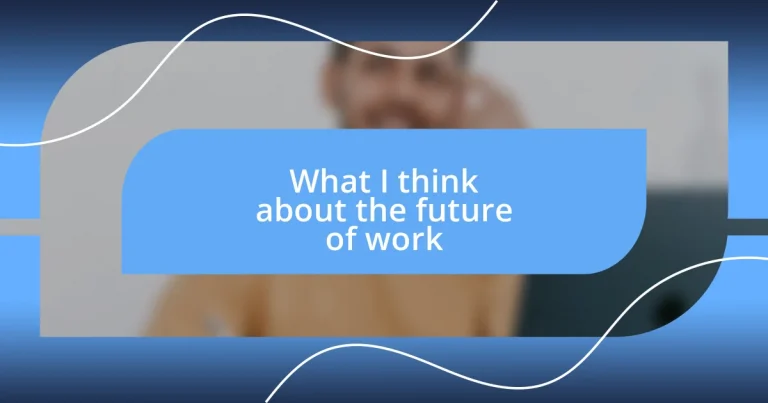Key takeaways:
- The rise of hybrid work models enhances productivity and work-life balance, emphasizing the need for flexibility in work arrangements.
- Collaboration tools play a crucial role in remote work, fostering connectivity while highlighting the importance of genuine communication to avoid misunderstandings.
- Developing a combination of technical and interpersonal skills, along with a growth mindset, is essential for adapting to future job markets and their evolving demands.
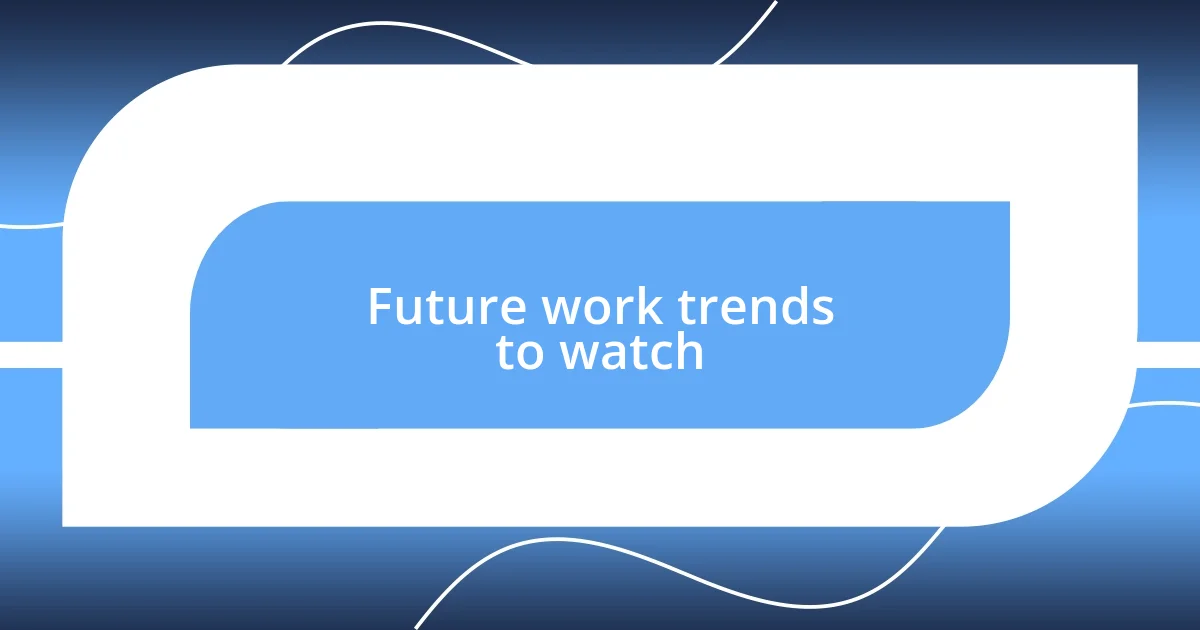
Future work trends to watch
One significant trend I see emerging is the rise of hybrid work models. Reflecting on my own experiences, I once juggled a mix of in-office and remote work during a particularly busy project. This approach not only increased my productivity but also improved my work-life balance—something I believe many are craving as they rethink their working arrangements. Isn’t it fascinating how flexibility can transform our daily routines?
Another trend to keep an eye on is the increasing emphasis on employee mental health. I recall attending a workshop where companies shared their initiatives to foster a supportive work environment. It was eye-opening to realize that prioritizing mental well-being not only benefits employees but also enhances overall productivity. Don’t you think that acknowledging our mental health at work will redefine company cultures?
Lastly, technology will continue to play a pivotal role in shaping how we work. With the surge in automation and artificial intelligence, I frequently find myself exploring tools that make mundane tasks more efficient. But here’s a thought: as we embrace these advancements, how do we ensure that human creativity and emotional intelligence remain at the forefront? I believe it’s a delicate balance we’ll need to navigate moving forward.

Technology’s impact on remote work
The shift towards remote work has been propelled by technology in ways I never anticipated. I remember the first time I attended a virtual meeting; the feeling was both thrilling and strange. It allowed me to connect with colleagues miles away, but there was also a unique energy when we all gathered in person. This duality highlights how technology can bridge distances while simultaneously making us feel more isolated.
Communication tools have transformed our day-to-day interactions. I’ve found that applications like Slack and Zoom can facilitate quick conversations that would have otherwise required a face-to-face meeting. However, I often wonder if the speed of these exchanges sacrifices deeper connections. After all, nothing quite matches the nuance of an in-person discussion. It raises the question: are we becoming more connected or merely more efficient?
As companies explore the digital landscape, the role of cybersecurity is more critical than ever. I once experienced a brief bout of panic when a colleague’s account was compromised, leading me to reevaluate the security measures in place for remote work. It’s become clear to me that as we embrace technology, we must also prioritize keeping our data safe. Striking that balance between advancement and security will be one of the defining challenges of our time.
| Technology Aspect | Impact on Remote Work |
|---|---|
| Communication Tools | Enhanced connectivity but potential for superficial interactions |
| Virtual Meetings | Convenience of distance collaboration versus loss of personal energy |
| Cybersecurity | Increased focus on data safety as remote work expands |
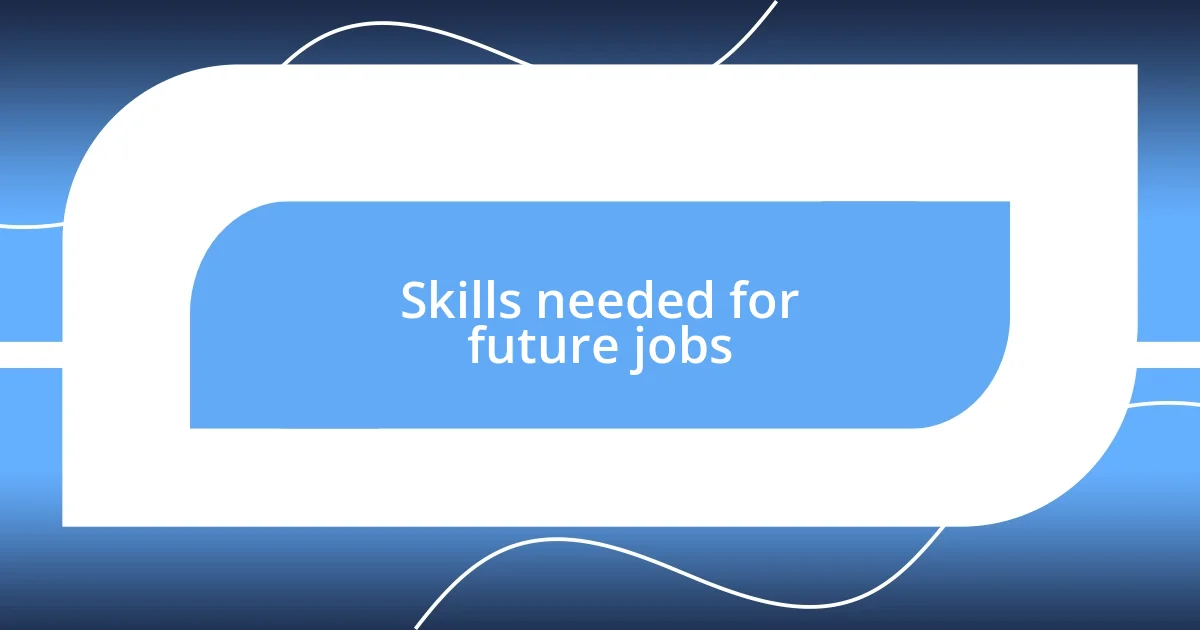
Skills needed for future jobs
As I think about the skills that will define the future workforce, critical thinking and adaptability come to the forefront. In past projects, I faced unexpected challenges that required me to pivot quickly, forcing me to analyze situations on the fly. This experience taught me the value of being flexible in my approach and maintaining a problem-solving mindset. It’s clear to me that the ability to adapt will be indispensable in jobs of the future.
Here are a few essential skills that I believe will be crucial:
- Technical Literacy: Understanding advanced tools and software that drive productivity.
- Emotional Intelligence: Recognizing and managing one’s emotions and empathizing with others.
- Collaboration: Working effectively in diverse teams, even across geographic boundaries.
- Creative Thinking: Innovating and generating new ideas in complex situations.
- Continuous Learning: Embracing lifelong learning to stay relevant in a rapidly changing environment.
Beyond the basics, I think digital communication skills will truly shape how we connect with colleagues and clients. I once had a mentor who emphasized the art of storytelling in presentations. This pushed me to refine my communication techniques, making interactions more engaging and relatable. Now, as more jobs rely on virtual communication, articulating thoughts succinctly and effectively is a game-changer. It seems to me that the ability to convey messages clearly will only gain importance as remote work becomes the norm.
In summary, the fusion of technical proficiency with interpersonal skills is something I see as vital for future jobs. The blend of these skills could not only elevate individual careers but also foster a more collaborative workplace. In navigating this new era, we must cultivate both hard and soft skills to thrive.
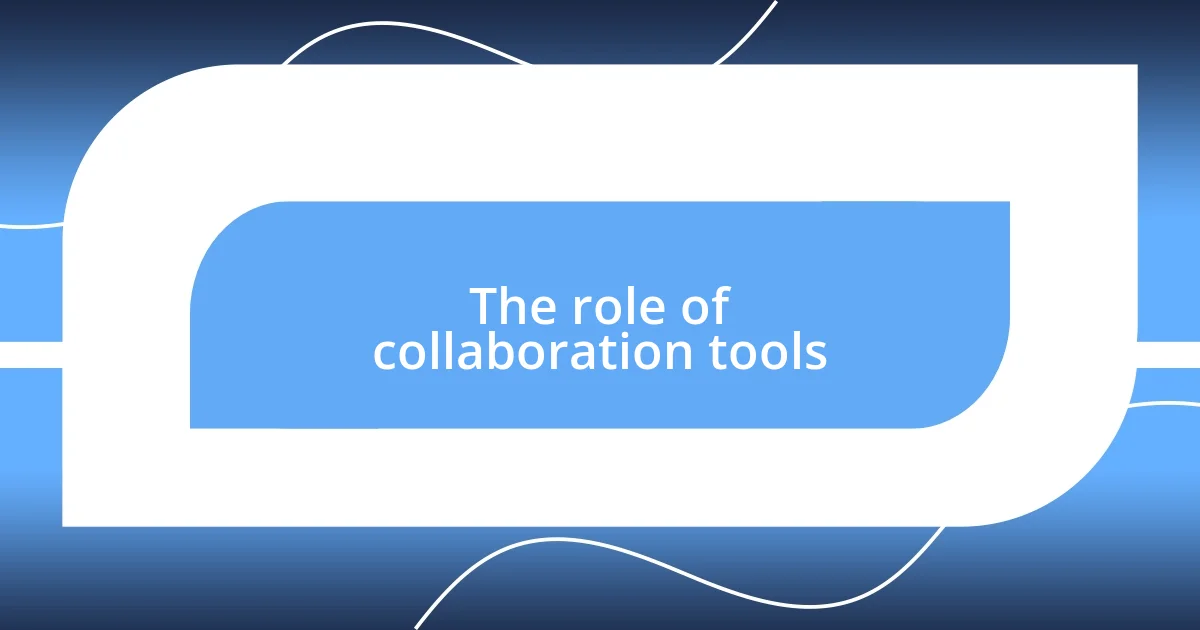
The role of collaboration tools
Collaboration tools have become the heartbeat of remote work. I remember the first time I used a project management tool like Trello; it felt like having a virtual whiteboard at my fingertips. Suddenly, instead of endless email chains and missed messages, my team could see what everyone was working on at a glance. It made us not just organized, but genuinely more connected in our mission. Isn’t it fascinating how a simple tool can transform the dynamics of teamwork?
As I reflect on my own experiences, I realize that these tools do more than facilitate work—they create a sense of belonging. I once participated in a brainstorming session using Miro, a digital collaboration space that felt both fun and engaging. Even from home, we could share ideas through interactive sticky notes and sketches, making the process lively. This experience reinforced my belief that collaboration tools can emulate the spontaneity of in-person brainstorming, sparking creativity in unexpected ways.
However, I sometimes wonder about the subtleties we might miss behind a screen. While collaboration tools are fantastic for enhancing productivity, they can lack the warmth and nuance of face-to-face conversations. I recall a time when a team’s disagreement escalated simply due to misinterpretation of messages on our chat platform. It left me questioning: can technology ever fully replace the authenticity of human interaction? Balancing these tools with genuine communication is crucial as we navigate this evolving landscape.
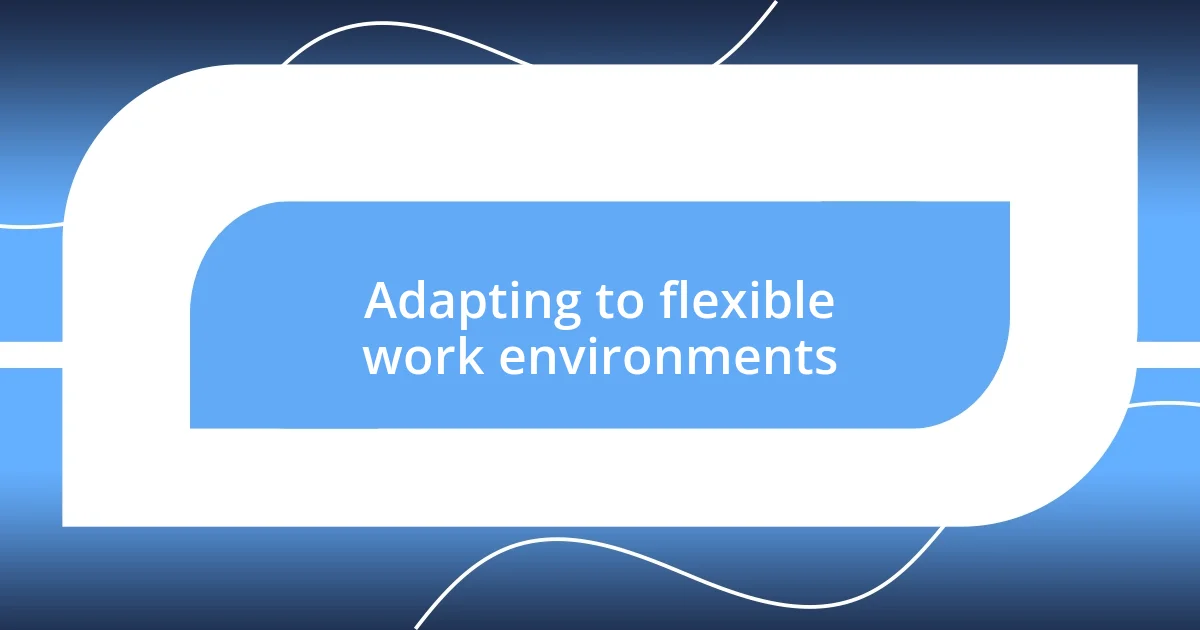
Adapting to flexible work environments
Adapting to flexible work environments is not just about adjusting where we work; it’s about reshaping how we think about productivity. I’ve experienced this first-hand while working remotely during a project that demanded a real shift in my daily routine. I found that establishing a dedicated workspace at home helped me maintain focus and separate work from personal life, initially a challenge for me. Isn’t it interesting how our environment plays such a crucial role in our effectiveness?
The process of shifting to a flexible work structure can also lead to surprising revelations about our own work styles. For instance, I recently experimented with variable hours, starting my day later and working in bursts. This arrangement allowed me to tap into my most productive hours and take breaks when my energy waned. I discovered that flexibility doesn’t just help with work-life balance; it amplifies my creativity and efficiency. Have you ever felt more inspired when given the freedom to choose your schedule?
Additionally, I believe open communication is key in navigating flexible work environments. In one of my recent team meetings, we embraced a “check-in” format where everyone shared not just project updates but personal insights. This practice fostered deeper connections and significantly enhanced our team cohesion, despite the distances between us. It left me wondering—how can we ensure that everyone feels included in this evolving landscape? Adapting to flexibility requires not just structural changes, but also a heartfelt commitment to support one another as we redefine how we work together.
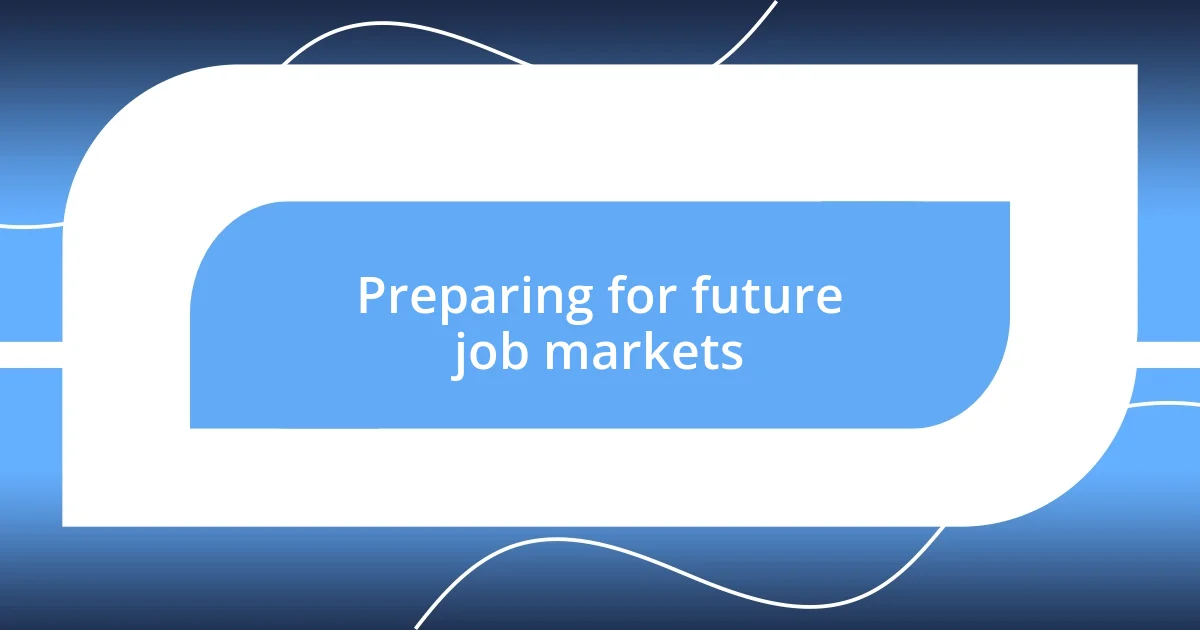
Preparing for future job markets

Preparing for future job markets
Being ready for future job markets means constantly evolving our skill sets to stay aligned with industry demands. I recall a time when I took a leap and enrolled in an online course for digital marketing. At first, it felt overwhelming, but that moment of self-investment sparked not just new knowledge, but a newfound confidence in my ability to adapt to any future shifts. Isn’t it amazing how learning can unlock doors we didn’t even know were closed?
Networking is another vital aspect that often gets overlooked. I remember attending a virtual conference where I connected with professionals from around the globe. We exchanged experiences and insights about emerging trends. That day, I realized that sometimes, just reaching out can lead to unexpected opportunities. How often do we underestimate the power of a simple conversation in shaping our career paths?
Lastly, being open to change and embracing a growth mindset is essential. I reflect on my own resistance to change in the past—it was daunting. Yet, those moments of discomfort often led to the most significant personal and professional growth. I now see every challenge as an opportunity to learn something new. How do you approach change? Seeing it as a chance to grow can completely transform our journey towards securing our place in the future job markets.












